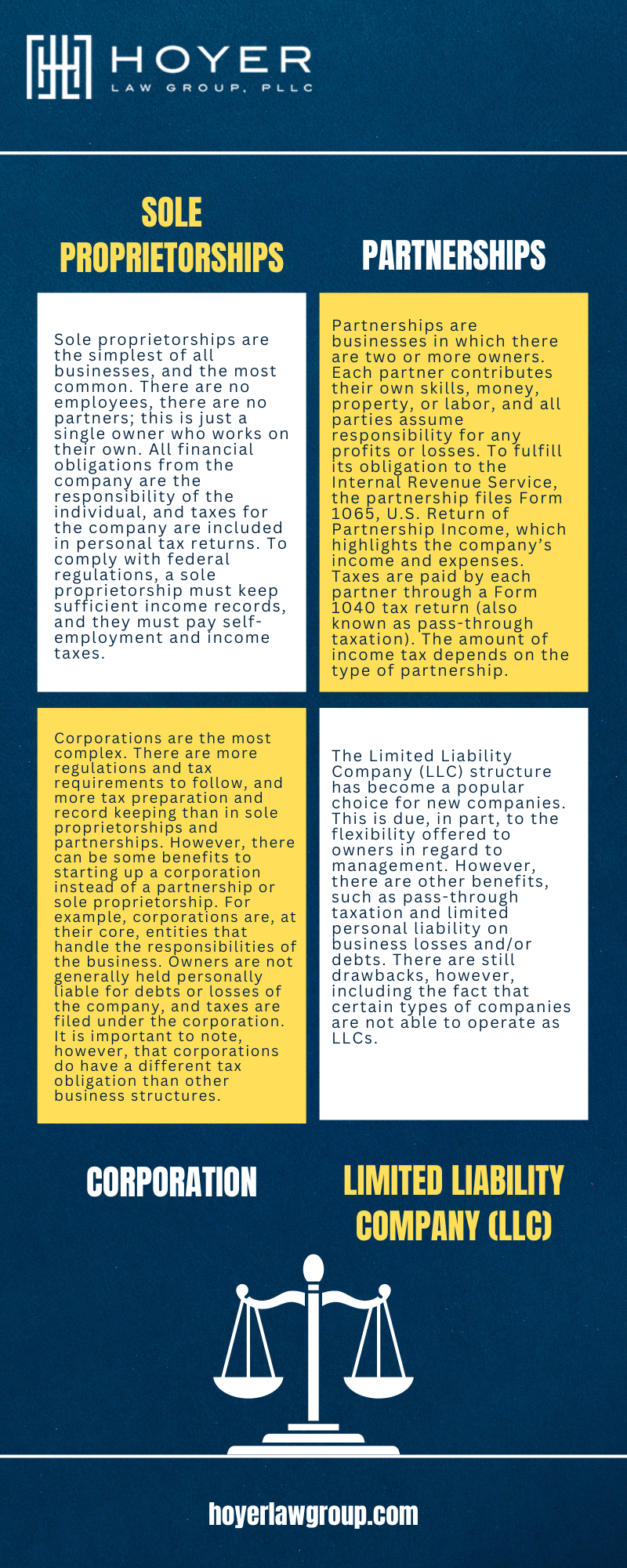Business Lawyer Tampa, FL
 Our Tampa, FL business lawyer knows that of all the decisions you will make during the life of your business, one of the most important is choosing your company’s organization type. This single decision will determine everything from how you will file your taxes and how your company borrows money to how long your business can operate and who will assume liability in the face of a loss or lawsuit.
Our Tampa, FL business lawyer knows that of all the decisions you will make during the life of your business, one of the most important is choosing your company’s organization type. This single decision will determine everything from how you will file your taxes and how your company borrows money to how long your business can operate and who will assume liability in the face of a loss or lawsuit.
The truth is that no two companies are the same, and no one decision is right for every business. This brief overview of the types of organizations should at least get you thinking about what might work best for your company so that you can be better informed while discussing your options with your business lawyer.
Sole Proprietorships
Sole proprietorships are the simplest of all businesses, and the most common. There are no employees, there are no partners; this is just a single owner who works on their own. All financial obligations from the company are the responsibility of the individual, and taxes for the company are included in personal tax returns. To comply with federal regulations, a sole proprietorship must keep sufficient income records, and they must pay self-employment and income taxes.
Partnerships (General, Limited, Limited Liability)
Partnerships are businesses in which there are two or more owners. Each partner contributes their own skills, money, property, or labor, and all parties assume responsibility for any profits or losses. To fulfill its obligation to the Internal Revenue Service, the partnership files Form 1065, U.S. Return of Partnership Income, which highlights the company’s income and expenses. Taxes are paid by each partner through a Form 1040 tax return (also known as pass-through taxation). The amount of income tax depends on the type of partnership.
Corporation
A Tampa business attorney knows that out of all the business structures, corporations are the most complex. There are more regulations and tax requirements to follow, and more tax preparation and record keeping than in sole proprietorships and partnerships. However, there can be some benefits to starting up a corporation instead of a partnership or sole proprietorship. For example, corporations are, at their core, entities that handle the responsibilities of the business. Owners are not generally held personally liable for debts or losses of the company, and taxes are filed under the corporation. It is important to note, however, that corporations do have a different tax obligation than other business structures.
Limited Liability Company (LLC)
The Limited Liability Company (LLC) structure has become a popular choice for new companies. This is due, in part, to the flexibility offered to owners in regard to management. However, there are other benefits, such as pass-through taxation and limited personal liability on business losses and/or debts. There are still drawbacks, however, including the fact that certain types of companies are not able to operate as LLCs.

Before You Choose an Entity, Speak with a Business Lawyer
While no one entity is better than another, it is important to choose the one that best suits your company’s goals, limitations, and needs. But you should not go at it alone; a qualified Tampa business attorney can help to ensure you understand all the pros and cons of each entity while helping you decide which option is best for your business. Call Hoyer Law Group, PLLC to learn more.
What is a Nonprofit Corporation?
As your Tampa, FL business lawyer from Hoyer Law Group, PLLC can review with you, a nonprofit corporation (also often called a not-for-profit corporation), is a corporation that has no shareholders and consequently pays no dividends. Instead, nonprofits plow their profits back into the business, which usually is some form of charity or charitable organization. You may think that the terms “nonprofit corporation” and “501(c)3 corporation” are synonymous, but such is not the case. While both are legal entities, separate and apart from the people who own them, they differ in one very important respect: their tax status.
Nonprofit Corporations
You establish a nonprofit corporation in much the same way as you establish a regular corporation, i.e., file the necessary paperwork to register the corporation as a nonprofit and the necessary paperwork, including Articles of Incorporation, to then set up your nonprofit. Establishing nonprofit status usually allows your corporation to receive benefits from your state, such as not having to pay sales tax. It also gives you the opportunity to apply for many types of grants.
501(c)3 Corporations
A 501(c)3 corporation is a nonprofit corporation that goes one step further and applies to the IRS for tax-exempt status at the federal level under Section 501(c) of the Internal Revenue Code. This section authorizes upwards of 30 types of 501(c) organizations depending on the focus of their businesses. A 501(c)3 corporation is one that pays no income or sales taxes at the federal level, and whose donors get to take their donations as income tax deductions. Filing for 501(c)3 status requires, among other things, that the corporation first obtain an Employer Identification Number (EIN) from the IRS.
Keep in mind that whether or not your nonprofit files with the IRS for 501(c)3 status is completely up to you. As your Tampa business lawyer may advise, if you are a small organization that doesn’t anticipate bringing in a lot of funding or seeking donations, you may wish to forego the expense and paperwork involved in achieving and maintaining 501(c)3 status. Your sponsors won’t need a charitable deduction because their sponsorship constitutes a qualified marketing expense that entitles them to a business tax deduction.
Obtaining Legal Advice
As with all business decisions, especially those regarding what type of business entity to form, your wisest strategy consists of engaging the services of an experienced Tampa business lawyer who can advise you of your business entity options, including the tax consequences of each. In addition, we can advise you of your state’s requirements for becoming a corporation, nonprofit or otherwise, and help you prepare your paperwork.
We know how exciting, albeit stressful, it can be to have your own business, which comes along with risks too. Having a legal team that you can turn to regarding business disputes or other issues can make all the difference in its success and future. For more information about business law, or to have specific questions answered, contact us at Hoyer Law Group, PLLC at your next convenience.
Business Lawyer FAQs
If you’re operating a business, a Tampa FL business lawyer can help you stay afloat. Contacting a lawyer is essential if you want to avoid disputes, or if you just want to focus on the day-to-day operation of your business without dealing with a pile of legal paperwork.
Businesses face numerous legal challenges throughout their lifespan, ranging from entity formation to contract negotiations and dispute resolutions. Hiring a skilled business lawyer can provide essential legal guidance and protect your business interests. Read on to learn more about how a business lawyer can help, and get in touch with Hoyer Law Group, PLLC today.
Why Do I Need A Business Lawyer?
A business lawyer plays a crucial role in ensuring legal compliance and protecting your company’s interests. Your legal team should possess the knowledge and expertise to handle various legal matters, including business formation, contract drafting, intellectual property protection, regulatory compliance, employment issues, and dispute resolution.
Having a Tampa business lawyer by your side can help you make informed decisions. They can also help you mitigate risks, safeguard your business, and – importantly – free up your time so you can focus on managing your business, instead of legal paperwork.
When Should I Hire A Business Lawyer?
The sooner the better. Whether you’re starting a new business or expanding an existing one, a lawyer can provide valuable guidance during the formation process. The right legal team can help you choose the appropriate business structure, and assist in drafting essential legal documents such as partnership agreements or operating agreements.
As an added bonus, a business lawyer can provide ongoing legal support as your business grows and faces new challenges.
What Services Can A Business Lawyer Provide?
Business lawyers offer a wide range of services tailored to meet the legal needs of businesses. Some common services include:
- Business formation and structuring
- Contract drafting and review
- Intellectual property protection
- Employment law compliance
- Tax planning and compliance
- Regulatory compliance
- Mergers and acquisitions
- Dispute resolution and litigation support
How Can A Business Lawyer Help In Resolving Disputes?
Disputes are an inevitable part of running a business. A skilled business lawyer can provide dispute resolution strategies, including negotiation, mediation, or litigation if necessary. He or she will work to protect your business interests, advocate on your behalf, and strive for the best possible outcome. With their legal expertise and negotiation skills, they can help you navigate complex disputes while minimizing the potential impact on your business.
How Do I Choose The Right Business Lawyer For My Needs?
Choosing the right business lawyer is crucial for the success of your business. Consider the following factors when selecting a business lawyer:
- Experience and expertise in business law
- Industry knowledge relevant to your business
- Track record of successful outcomes
- Good communication and responsiveness
- Compatibility with your business values and goals
- Transparent fee structure
Contact Hoyer Law Group, PLLC Today
Business lawyers play a vital role in safeguarding your company’s legal interests. From entity formation to contract negotiations and dispute resolutions, their expertise and guidance are invaluable in navigating the complexities of business law.
If you’re ready to protect your business (or just keep it running at maximum efficiency), get in touch with Hoyer Law Group, PLLC today, and see what a Tampa business lawyer from our office can do for you.
False Advertising and Deceptive Business Practices Can Lead to Legal Issues for Your Company
A Tampa, FL business lawyer knows that advertising to potential clients and customers is a critical component of any business. This is why many companies design their advertising campaigns to target specific markets, trying to tailor their products and services to meet the needs of that market. Unfortunately, some companies end tailor their advertising so much that it results in misleading or false advertising. When this happens, they may find themselves facing serious lawsuits from customers who feel they were tricked or lied to by the company. Should you find your company facing false advertising allegations, contact Hoyer Law Group, PLLC right away.
Definition of False Advertising
False advertising is often encompassed in the legal definition of deceptive or fraudulent trade practices. If the business is found to have intentionally engaged in fraudulent or deceptive advertising, the business can be liable for attorneys’ fees and other fees associated with the consumer’s lawsuit.
Deceptive Practices
There are various practices that can be deemed deceptive practices when it comes to advertising. For example, making an advertisement that confuses consumers as to the origin of the goods or services. A business can do this when it is trying to capitalize off the success of another business and makes an advertisement implying it has the same services or products offered by the other business, even when they are not.
If a company advertises goods or services that they know they will not be able to fill all the orders that consumers may be reasonably expected to buy, this is also considered deceptive practice. If quantities are expected to be low, then a disclaimer should be added to the advertisement alerting consumers that quantities are limited. Your Tampa business lawyer can help you with the wording of that disclaimer.
Bait and Switch
Sometimes businesses advertise goods at a low price just to get consumers in the store, knowing that the store cannot fill all reasonably expected orders, as a ploy to get consumers to buy more expensive items. This is known as bait and switch. Not only is this a deceptive business practice, but it can also cause consumers to lose faith in the business. Regularly engaging in this kind of advertising can cause a business to lose customers instead of gaining new ones.
Disclaimer Use
Sometimes businesses may use disclaimers along with the advertisements to warn consumers about claims in the advertisement that may be interpreted in a different way, or if a claim made in the advertisement is not proven. Including this kind of disclaimer does not mean that a business can make blanket fraudulent statements because the disclaimer can be found to have been inadequate in the context of the advertisement.
Frequently Asked Questions About Business Lawyers
Businesses operate in a complex legal landscape, but a Tampa FL business lawyer can help you find your way through the red tape. Read on to learn more about why a business lawyer is such an essential part of your team, and get in touch with Hoyer Law Group, PLLC to get started.
What Types Of Legal Issues Can A Business Lawyer Assist With?
Business lawyers have a broad range of expertise and can assist with various legal issues you might encounter when running your company. Your lawyer can provide guidance on business formation, contract drafting and negotiation, intellectual property protection, and more.
Whether you have questions about business contracts and employee relations, or you just need someone to handle the legal side of your business, a lawyer can help you focus on what matters most.
When Is The Right Time To Consult A Business Lawyer For My Startup?
The sooner the better. Consulting a business lawyer early on is crucial for startups. When you’re just launching a business, you need to be sure you’re doing everything by the book – at least from a legal perspective. Your lawyer can guide you through your first steps, including entity formation, protecting your intellectual property, and complying with any legal regulations.
Having a business lawyer by your side from the beginning can save you time, money, and potential legal complications down the road. Plus, since they have plenty of experience dealing with businesses of all size, they can help you prepare for your next steps as your startup grows.
How Can A Business Lawyer Help With Mergers And Acquisitions?
Mergers and acquisitions (M&A) involve complex legal processes, negotiations, and plenty of due diligence. Fortunately, a business lawyer experienced in M&A transactions can provide valuable guidance throughout the entire process.
Your lawyer can assist with contract drafting and review, conduct thorough legal due diligence, and navigate regulatory requirements. They can also help you negotiate deal terms to ensure a smooth transition for both buyer and seller. A business lawyer’s expertise can help you protect your interests and maximize the potential benefits of a merger or acquisition.
What Role Does A Business Lawyer Play In Dispute Resolution?
Disputes happen. Whether it’s a disagreement between shareholders or a breach of contract, a business lawyer can play a pivotal role in resolving these problems efficiently and effectively. Your lawyer can help explore negotiation and mediation options, represent your interests in arbitration or litigation if necessary, and work towards finding everyone a favorable resolution. It’s important to have a Tampa business lawyer by your side to keep things running smoothly.
How Can A Business Lawyer Assist With Regulatory Compliance?
Businesses must comply with a whole web of laws and regulations at the local, state, and federal levels. If you fail to comply with these laws, it can result in severe penalties and legal consequences.
Fortunately, your legal team can assist with obtaining necessary licenses and permits, navigating industry-specific regulations, and staying updated on any changes in the legal landscape that may impact your business.
Contact Us For Legal Assistance
If you are considering launching an advertising campaign for your business, make sure you are not opening your company up to any type of legal action. Contact Hoyer Law Group, PLLC to schedule a consultation with a skilled Tampa business lawyer and make sure your company is protected.




